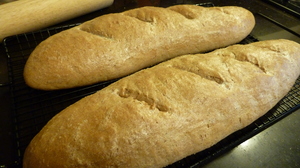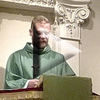My first sermon as pastor of Lutheran Church of the Cross. This is a message about when Jesus tells us "eat me" he sometimes means it metaphorically.
Listen to the sermon rather than read it. The text is included for your convenience, but it is not entirely like the delivered version, which includes nuances that can't be read.
Sermon delivered at Lutheran Church of the Cross in Berkeley.
August 16, 2015 - Twelfth Sunday after Pentecost.
"Gnawing God". Text is from John 6:51-58.
Greetings to you, my sisters and brothers, saints and sinners, children of God. It is with gratitude that I am at last up here in front of you, unordained and uninstalled, yet pastor of this fine church nonetheless.
And what an interesting and strange gospel reading to have as my first sermon as pastor of Lutheran Church of the Cross. Because this passage from John is the 4th week in a 5 week series coming straight from John Chapter 6 in what is commonly referred to as the "Bread of Life" discourse. It started several weeks ago, with Jesus feeding a hungry group of people bread and fish, the same event that takes place in all four gospels, and then, Jesus leaves the crowd until the next day in which they found him again, seeking out the man who the hungry folks realize if they can just capture him and keep him, they can never have to go hungry again, because he'll continue to keep making bread for them over and over again.

But as Jesus explains, what they really want, what we all really want is a different kind of bread, and that this bread of life will not only sustain them it will allow them to live forever. Jesus is speaking metaphorically, but the crowds following him, having just eaten their fill only the previous day, are taking it very literally. As such, the conversation begins to get stranger and more graphic. He begins to talk in terms of eating his flesh, and drinking his blood. The Judeans who have been following him are now shocked and appalled. If you know anything about Jewish customs, to come into contact with any sort of blood makes one ritually unclean, and so the thought of drinking one's blood is even more horrifying.
But while there is much debate among historical scholars about the intent in this particular passage, whether it directly relates to an anticipation of the Last Supper, or, as Martin Luther had thought about it, it was a more metaphorical description of faith, we cannot help thinking about his body, given for us, his blood, shed for us and for our sins when we hear Jesus say to "eat him."
One interesting thing about the Greek text, however. What we read as "Eat" in these passages in English are actually two separate words. First is "esphio", which is the usual Greek verb for eat, which we find in verse 52, when the Judeans ask "How can this man give us his flesh to eat." The second, "trogo" begins in verse 54... "Those who eat my flesh...", and is more intentional. This word is often translated as "gnaw" such as an animal would do with a bone. Jesus is actually telling the Judeans that one must gnaw on his flesh in order to abide in him, and that whoever gnaws on him will live because of him. Those are some serious visualizations that Jesus is projecting in this conversation, and it may be no surprise when we hear later on that many of those who heard this were troubled by it.
But what are we supposed to make of these rather graphic illustrations that Jesus has? How do we, in the age of zombies and vampires in our collective pop culture consciousness, feast on the word that Jesus is providing for us in these graphic and somewhat disconcerting visuals? How do we gnaw on the scripture, to better understand the intent of Jesus or even the writer of John, who chose these words of Jesus at this point in this Gospel to better gather together a church community that had already begun to worship God in many of the same ways that we ourselves worship him today.
Those of us who have been among the church community, who have been raised or catechized or confirmed in the Christian faith read passages like these and may glance over the bizarre aspects while reaching for the central message of either the means of grace that is interred into us by way of the Eucharist or the symbolism of feasting on Christ as being a way of ingesting the gift of faith that God has provided for us in the death and resurrection of Jesus our Lord, People less versed in the faith might view these passages with some skepticism or even mockery, evidence that the root of our faith is deep in bizarre acts, like cannibalism or vampirism, at a loss to to gather together the deeply rooted, faith-driving nature of Jesus' sayings. As Christians, we may even find it difficult to defend the sacredness of divine scripture in light of the uncomfortable text that we find ourselves reading here.
But it is in the mystery of that faith that he has given and prayer and power of the Holy Spirit that gives us, the believers and children of God an opportunity to step back and discern the message that is found in the gospel. That although we may sometimes be confronted with messages in our scripture that initially appear to be confusing or embarrassing, that the underlying text in fact may be read in light of scripture as a whole or by virtue of the lens of his greatest commandment.
We are called as children of God to love the Lord God as he loves us and to love one another as ourselves. That when Jesus asks us to feast on his flesh and drink his blood, we know that while we believe as Lutherans that the bread and wine or grape juice that we consume in the sacrament are indeed the body and blood of Jesus Christ, that he also means that we also take Jesus into ourselves in faith, and that means we act as Christ acts, that we love one another as God loves us and that we love...or ought to love ourselves.
And that can sometimes be hard and it can sometimes be seen as foolish. Particularly when want to be like our contemporaries and liked by people as friends in our community, and that sometimes means acting in wasy that the world expects us to act, selfish, self-seeking, putting ourselves before others. Paul tells us in First Corinthians that the message of the cross is foolishness. And indeed, that cross, that humiliating death sentence that Jesus was given in front of the people of Israel, by the people of Israel, was viewed in those times in such a negative light, that even the disciples went and hid. Peter denied ever even knowing Jesus.
But we have been given an amazing grace to that restores us into right relationship with God. And just as these words of Jesus may sometimes embarrass us, particularly if we feel we have to explain away our faith to non-believers, those that cannot understand our connection to the scripture and the word of God, so it underscores the very mystery of our faith.
That though it is impossible that this bread and wine be miraculously transformed into the body and blood of Jesus Christ at the altar, we yet ourselves encounter the miracle of that transformation as we approach the altar feast on that living bread which has become his body, and the wine and juice becoming his blood. The incarnation means that Jesus is truly present, and that the welcome to the table is a welcome to the mystery of the miracle of the presence of Christ our Lord.
The challenge of this new joining of pastor and congregation, especially the joining of this particular pastor with this particular congregation which itself has a strong mission of being one which is welcoming to all is the maintenance the centrality and sacredness of our faith which underlies all that we do, all who we are. The sacramental, living presence of Jesus here in this place, and especially here at this table strengthens and encourages us to act out that loving mission of welcome, the gift of grace in his sacrifice binds us to extending our hands and our hearts to those in our community that hunger and thirst for God's comfort, strength, and healing.
It is the incarnate, living presence of Christ in the Eucharist that calls people forward. The actual promise of salvation that compels us to the table where we experience a foretaste of the everlasting feast of our Lord. And while we know that our God is with us everywhere, It is in the centrality of our worship that we openly and honestly encounter him among each other and within, atop and around our sacrament of holy communion, that God's Holy Spirit makes herself known within each and every one of us, and ignited by the mark of our baptism gives us the drive to carry Christ with us forward.
We are the people of God, my sisters and brothers, all of us, and there is nothing embarrassing about that. When the love of the living Father pours out through our words and our deeds, the awkwardness of the words of Christ and the folly of the his death on the cross become wisdom of the ages and the glory of his resurrection.
And so, my sisters and brothers, be welcome at the feast. Saints and sinners, gnaw on the bread and wine that are his flesh and blood. Children of God, be filled with the spirit. And pour out the good news that God has made for each and every one of us. Amen.


